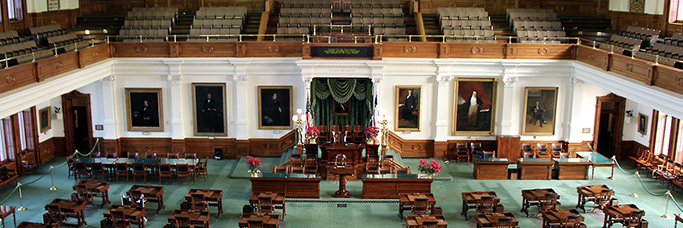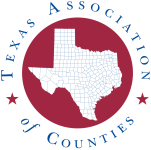Outreach Tools
Collaborating With the Legislature

The Texas Legislature
The Texas Legislature, composed of 150 members in the House of Representatives and 31 members in the Senate, meets during regular legislative sessions beginning in January for 140 days every odd-numbered year. The governor can also call the Legislature into special sessions, each of which can last no longer than 30 days.
Senate
In the Senate, the presiding officer is the lieutenant governor. The lieutenant governor appoints members of the Senate to committees, designates the chairs of those committees and refers bills to committees. The lieutenant governor also sets most bills for floor consideration on the Senate Intent Calendar.
Generally, the lieutenant governor has discretion on whether a bill is deliberated by members of the Senate, and bills set on the Intent Calendar are not always necessarily considered. Moreover, any bills considered will not necessarily be considered in the order listed on the calendar. Bills designated as local or uncontested are scheduled for consideration by the Senate Administration Committee.
House
In the House, the presiding officer is the speaker who is elected by the members. The speaker appoints members of the House to committees, including the chairs of those committees, and refers bills to committees.
The House Calendars Committee schedules bills for consideration on the House floor, and the bills generally must be considered in the order they are placed on the calendar. Bills that are designated as local or uncontested are scheduled for consideration by the Local and Consent Calendars Committee.
Committee Process
Once a bill is assigned to a Senate or House committee, it may be scheduled for a hearing to receive public testimony.
Parties interested in providing testimony on a particular bill during session, should generally plan on spending a full day at the Capitol. The Legislature is a moving target, and the committee hearing schedule printed in the morning could change. Committees may have to recess while the House or Senate is in session, or they may not start meeting until late in the day. Moreover, bills may not necessarily be considered in the order they are posted on a committee hearing notice, if at all.
Prior to testimony, a witness affirmation form needs to be completed with contact information and indication of support, opposition or neutrality on the particular bill. Those unable to testify may still submit a witness affirmation form indicating support or opposition to the bill, and it will be noted in the official record.
House and Senate Witness Registration
Online witness registration is the new, quick and paperless way to register and complete the witness affirmation form for upcoming committee hearings in both the House and the Senate. Complete the five-step registration process when you arrive at the Capitol by using the touch screen kiosk stations located in the Capitol Extension. You can choose to save your profile information to use for future hearings. You can save time by creating your public profile in advance; however, you may only register for, against or on a bill at the kiosk stations in the Capitol or from a mobile device when connected to the Capitol wifi network by visiting http://hwrs.house.state.tx.us. Be prepared by knowing:
- The correct bill number.
- The committee in which the bill is being heard.
- The time and location of the hearing.
Registration stations are located in the Capitol Extension on levels 1 and 2. However, some Senate committees will require a paper affirmation form that you will fill out in the committee room. For assistance with the registration process, please contact the committee clerk of the committee for which you wish to testify. TAC Legislative staff is also available to assist you.
Committee Testimony Tips
During the Hearing:
- Share concerns prior to the hearing.
Deliver the important information prior to the hearing. Meet with members or their staffs and let them know what’s important. If opposed to a bill or have specific concerns, it is important to try to notify the legislator and/or staff prior to a committee hearing so that they are aware of the concerns and won’t be surprised. If a bill has a potential local fiscal impact, try to provide specific information on the local impact of the bill to the Legislative Budget Board before the hearing. - Familiarize yourself with the members.
Know the members who know the issue. If possible, know your allies and your opponents.
During the Hearing:
- Be brief.
Keep testimony brief. Try to limit testimony to three to five minutes (or within the allotted time frame). - Be courteous to all.
When testifying, always be courteous to every member of the committee. Recognize all the committee members and thank them for providing the opportunity to testify. - Remain honest.
Always be honest. Never mislead the committee or give incorrect information. If you don’t know the answer, don’t be afraid to tell them you don’t know but will get back with them. - Testify on the local impact.
Try to include testimony on the local impact of a particular bill. Address how the bill would affect your county, office or taxpayers, if possible. - Avoid repetition.
Try not to repeat prior testimony. Often, prior witnesses will deliver testimony similar to intended remarks. If that is the case, try not to repeat the same testimony, but perhaps offer a different angle or discuss a specific local impact. - Summarize testimony.
Try not to read your testimony. If possible, organize the testimony on an index card and summarize key points. Be conversational with the committee on your issue and be ready to answer questions. - Distribute handouts.
Distribute written handouts of your testimony. Deliver the copies to the clerk of the committee. Keep them simple, well-written and easy to understand. - Know that your testimony is part of the record.
Remember that testimony is still considered even though the entire committee may not be present. At times, usually because of member schedules, there may be only a few members of the committee at a hearing listening to testimony. However, the testimony is considered part of the official record, and all committee members will typically receive copies of any written testimony submitted and/or receive a briefing from their staffs.
General Legislative Advice
- Learn about a legislator’s background, committee assignments, voting history, personal and business interests and past support for local government. Do this before your initial contact.
- Meet with your legislators prior to session. Let them know your issues.
- Get to know your legislator’s staff and work with them.
- When speaking with a legislator, always be brief and to the point. Try to emphasize the important parts of your message within the first three minutes.
- The mere fact that you want a certain bill to pass or that it is “good for county government” is generally not enough. Focus on how the issue would affect your county. Discuss how significant the legislator’s vote can be on the way your county serves your constituency.
- Never blindside a legislator. Always tell the entire story.
- After presenting your case to the legislator, simply ask the direct question: “May I count on your support?” If the legislator agrees, extend your appreciation and offer your assistance. If the legislator is non-committal, seek out the concerns. Schedule another visit to present new material that may help convince the legislator to vote your way. Don’t be discouraged. It sometimes takes a series of contacts to win over a legislator.
- If the legislator continues to be non-committal, ask colleagues in the legislator’s district to help. Contact from several county officials and constituents could help demonstrate community and constituent support for your position.
- Be understanding. Recognize there are legitimate differences of opinion. Show the legislator the consideration you expect for yourself. If the legislator chooses to vote differently from your position, politely express your disappointment and offer a closing argument to support your issue.
- Don’t expect the legislator to have your familiarity with county issues. Share what you know.
- When you work on legislation, always follow your bill throughout the process. If the bill requires a state agency to implement the legislation, follow the rulemaking process on the issue. The intent of the bill could be drastically altered in the rulemaking process.
- When a legislator or a staff member contacts you for information, respond promptly with accurate information.
- Be prepared to discuss your issue(s) anywhere at any time. You may run across a member who needs information on demand. • Know the deadlines -the House and Senate have different deadlines. • When you are at the Capitol, wear your Sunday best.
- Turn off your cell phone or put it on vibrate in committee hearings, legislative offices, and the House or Senate gallery
When traveling to Austin to visit with legislators, county officials are encouraged to use the resources provided in the TAC building, including the parking garage, meeting rooms and business center.
If you have any questions, please feel free to contact the TAC Legislative Department at (512) 478-8753 or toll-free at (800) 456-5974.

